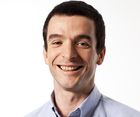Template:Staff and contractors: Difference between revisions
No edit summary |
No edit summary |
||
| Line 614: | Line 614: | ||
| image = Steven Walling 004 - Wikimedia Foundation Oct11.jpg | | image = Steven Walling 004 - Wikimedia Foundation Oct11.jpg | ||
}} | }} | ||
}} | }} | ||
Revision as of 00:25, 13 December 2012
Office of the Executive Director
A Polish-American who is starting a new civilization -- from scratch -- in the Midwestern US. Marcin came to the U.S. from Poland as a child. He graduated with honors from Princeton and earned his PhD in fusion physics from the University of Wisconsin. Frustrated with the lack of relevance to pressing world issues in his education, he founded Open Source Ecology in 2003 in order to make closed-loop manufacturing a reality. He began development on the Global Village Construction Set (GVCS) (see his 2011 TED Talk), an open source DIY tool set of 50 different industrial machines necessary to create a small civilization with modern comforts.
His work has recently been recognized in his acceptance as a 2012 TED Senior Fellow, a 2012 Shuttleworth Foundation Fellow, and his TED Talk was named the top 6th in the Huffington Post Best of TED 2011. His goal is to create the open source economy - an economy that optimizes both production and distribution - while providing environmental regeneration and social justice. To this end, Marcin is currently building a team of global collaborators and on-site builders for his land-based facility - to take this from concept to reality. He believes that the open source economy is a prerequisite to autonomy that allows people to pursue mastery - consistent with higher purpose.
Global Village Construction Set (GVCS)
The Global Village Construction Set is a modular, DIY, low-cost, high-performance platform that enables fabrication of the 50 different Industrial Machines that it takes to build a small, sustainable civilization with modern comforts. See Key Features
Fundraising
The fundraiser is turning into something that educates Wikimedia users about how our projects and movement work. Tens of millions of users click on banners and read the appeals every year. The primary mission of the Wikimedia Foundation fundraising team is now to improve that educational function. Imagine future campaigns that focus on recruiting new editors more than new donors. That's what we're trying to get to.
Template loop detected: Template:Anchor
Legal and Community Advocacy
Legal and Community Advocacy team members oversee all legal matters for the Foundation and focus on key initiatives to help support the community consistent with our Foundation goals and values. This team deals with a wide range of issues and projects, including policy drafting, trademark and copyright law, international law, employment law, litigation, fundraising and grant law, domestic and international contracts, privacy law, ethics, internet law, and non-profit corporate governance.
The team is also charged with carrying forward the Foundation’s goals of advocating for the community in new ways, including fighting for content online, facilitating community discussions about critical Wikimedia Foundation initiatives that affect the community, better supporting Wikimedia administrators and functionaries, and providing information about legal and legislative issues that impact online content.
Learn more about the team's responsibilities.
Finance and Administration
The Wikimedia Foundation is proud to be one of the most transparent non-profit organizations in the world. For updates about our program activities and our Annual Report, start at our home page.
Human Resources
If you believe in making education and knowledge free, and you love what you do and want to bring your skills and experience to our organization, check out our job openings. If you'd like to keep up to date as new positions are posted, you can subscribe to our wikimediaannounce-l mailing list or follow our micro-blogging feed (on Twitter or on Identi.ca).

